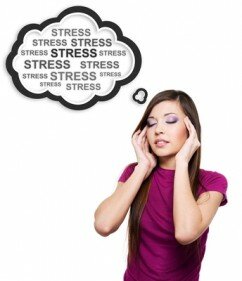

Stress is a topic I write and talk extensively about. I consider it one of my passions to help others overcome stress and reclaim lost energy in their lives. In this post, I want to explain just why this subject is something I’m passionate about. Before I begin, it’s important to distinguish between two categories of stress: eustress and distress.
The Good Stress
Eustress is the experience of being excited, enthusiastic, passionate, and engaged. You may feel a tension – but it’s a tension that feels good. Many people describe this feeling as being highly energized, inspired, or otherwise motivated.
Since eustress feels good, you may not label it as “stress”, yet some of the physical responses are the same – increased heart rate, dilated eyes, perhaps a bit of light sweating.
This is the the type of stress everyone needs to stay challenged, productive and motivated. Click to Tweet!
When stress becomes intolerable or unmanageable for whatever reason, it becomes distress…
 The Bad Stress
The Bad Stress
Distress is like the evil twin of eustress. Most everyone is familiar with distress – it’s often labeled as frustration, worry, anxiety, overwhelm and pressure. This is the kind of stress you feel when tension continues to mount without any end in sight. You may begin to feel overwhelmed – powerless, even.
Distress isn’t just “all in your head”…physiological symptoms of distress include increased blood pressure, rapid breathing and general tension. Eating too much (or in contrast, appetite loss), excessive drinking, smoking, and/or other negative coping mechanisms are all behavioral symptoms of this type of stress.
Distress that goes unaddressed for days, weeks, months, or even years can seriously diminish the quality of all aspects of your life – work…relationships…personal wellbeing.
My Stress Story
My experience with stress started young – I grew up as a very distressed little girl. Although I was comfortable around the people I knew well, I was very shy and would shut down when I was outside of my home environment.
In high school, I often felt exhausted after school because it was so stressful for me. I became so focused on what I lacked and what was challenging me that I was literally wiped out.
 And then, in my senior year of high school and in college, I started to gain a perspective that was totally new for me. I read three books that completely changed the way I thought about stress – and ultimately, my life. Why? Because I finally had an opportunity to realize I’d been taking things way too seriously – and too personally.
And then, in my senior year of high school and in college, I started to gain a perspective that was totally new for me. I read three books that completely changed the way I thought about stress – and ultimately, my life. Why? Because I finally had an opportunity to realize I’d been taking things way too seriously – and too personally.
My own stress level went way down, and because it did, I started to become much more adventurous and willing to try new things. I was even okay with saying and doing the “wrong thing” – because I was okay with admitting missteps and then moving on instead of beating myself up or feeling guilty.
I feel so good – and I want everyone to feel that way – all the time! In fact, this subject excites me so much, it causes me to experience eustress.
I bet you’re wondering about those three books I read. They are:
- Don’t Sweat the Small Stuff and It’s All Small Stuff by Richard Carlson
- If Life is a Game, These are the Rules by Cherie Carter-Scott
- The Four Agreements by Don Miguel Ruiz
Remember that not everyone will respond in the same way after reading these books. It’s important to find ones that you resonate with. For other inspiration, find out what books and resources your friends recommend, ask a trusted mentor, or research online using Google or by reading reviews on websites like Amazon.com.
I and other experts will be sharing more tips and strategies for dealing with stress on the Stress Free Living Telesummit. You can GO HERE to get more information and register.
Share your story: Has there been a particular book or other resource that changed the way you think about – and respond to – stress? Post your comments below.


